#regarding suicide
Text
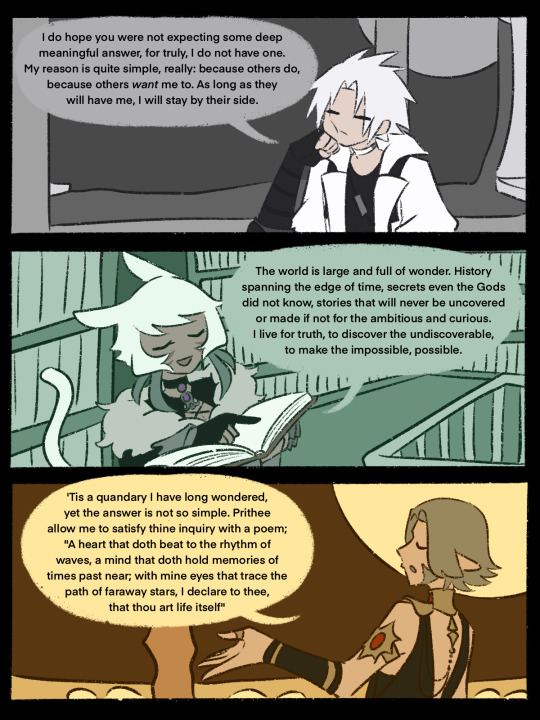
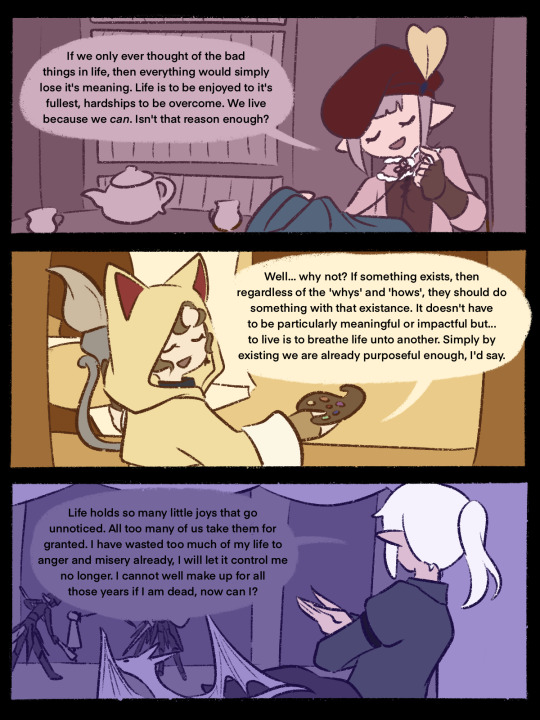
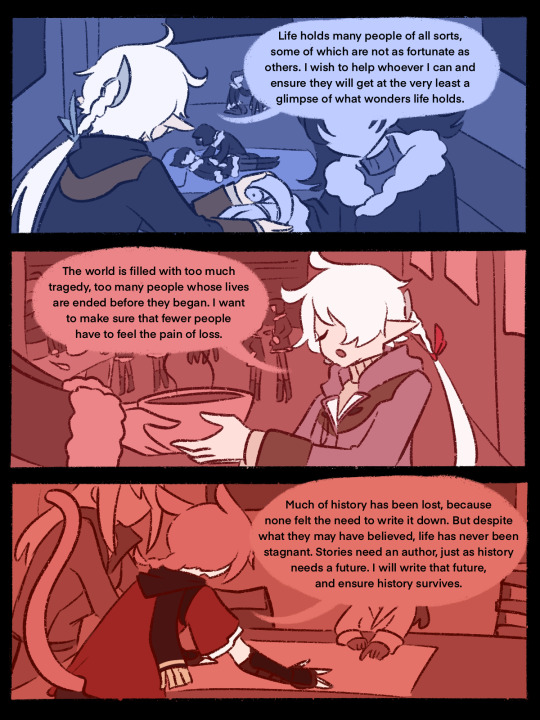
For what do you live?
#meant to post this a lot earlier but it just didnt... feel right?#and now im like fuck it. woe sciosn be upone ye#i was originally gonna have banana(wol) here too but then the amount of panels would be uneven >:(#so i removed her (im srry bby i love u i prommy </3)#anyway. i love them and seeing them fight for their right to exist in ew despite several of then having had#issues and doubts and all that in regards to their own lives and well-being hit me hard#i mean several of them are implied to not mind dying/not caring about surviving and at least one of them is/was explicitly suicidal!#and yet!!!!!!#OUGH#thancred waters#y'shtola rhul#urianger augurelt#alphinaud leveilleur#alisaie leveilleur#g'raha tia#tataru taru#krile mayer baldesion#estinien varlineau#estinien wyrmblood#final fantasy#final fantasy 14#final fantasy xiv#ff14#ffxiv#art#my art#xanders art#digital art#fan art
1K notes
·
View notes
Note
okay guys I see what ur saying with the Dazai critiques, man’s insane. I personally enjoy that insanity but yk, fair game to hate
but I have to say that I at least don’t defend yk. bc it would be exponentially funnier if I did, but my heart wouldn’t be in it </3
this leads me to remembering one of my favorite comments ever on dazai opinion that I found on Twitter X once
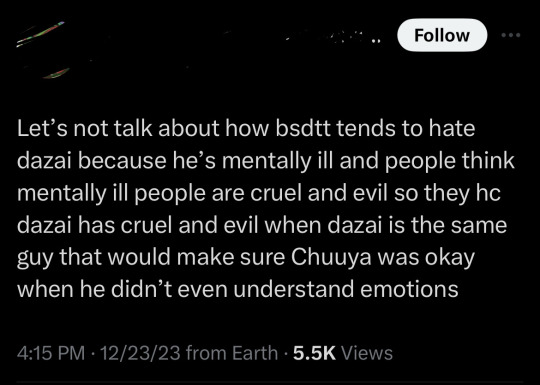
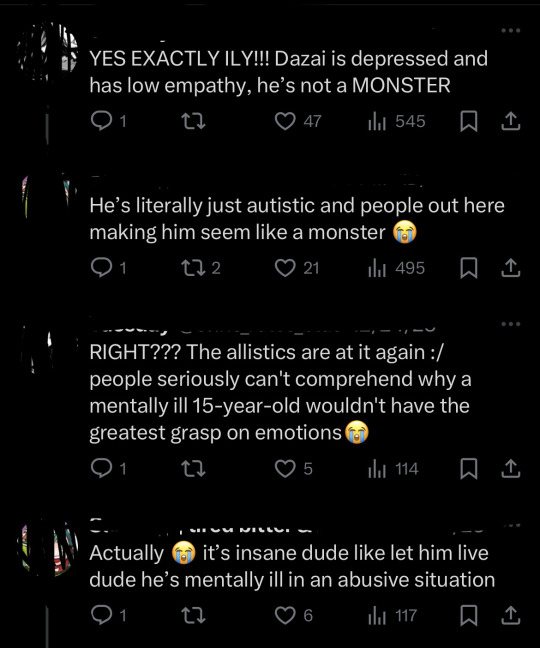
actually hilarious to me to see ppl simplify the murder as mental health… it’s just… how
crazy stuff, fr
cuz dazai has hundreds of counts of murder and torture and manipulation… but he’s just sad uwu
im cackling at this rn hkyxkagrgea
bsdtt try to actually characterize anybody in bsd fucking correctly challenge (impossible) GO‼️‼️ imagine calling dazai a cruel and heartless individual when he literally wrests control of his entire fucking life at the mere age of eighteen DESPITE being suicidal and devoid of emotions and any will to live after the death of his dearest friend/parental figure. do they understand how mentally STRONG someone has to be in order to do that? do you guys fucking understand how EASY it would have been for dazai to let that be his breaking point and finally kill himself? every time i look back at oda's death scene i am stunned and miserable at how reluctantly dazai gets up. like he wants to die right there too. but he picks himself up and escapes the mafia. he carves a life out for himself despite being a fucking hollow shell of a human. a husk of the boy he could've been had oda not died. alienated from society with no skills outside of the mafia despite his analytical mind with the word "traitor" on his head and no one by his side. can you imagine doing all of that while being barely at the brink of adulthood? that was a CHILD.
#literally miserable every time i think of pm dazai#he's horrible and manipulative but he was literally suicidal and so so mentally ill he couldn't realize what he was doing#not to mention the dehumanizing environment he was in. being trained as mori's successor w no regard of his own emotions.#not even seen as a person outside of his high analytical capabilities#i may hate that mf but i won't be caught dead mischaracterizing him unlike 90% of his stans. that alr makes me better than them#lotus's asks
56 notes
·
View notes
Text
ruby’s flaw is that she’s too nice. she’s genuinely hurt if you tell her that klaasje/tommy betrayed her. she left la puta madre because there was too much “murderous shit.” she stuck her own head inside the pale latitude compressor before using it on you because she thought it was ethical. she talks to old ladies and watches the sunset. she’d rather kill herself than kill you or kim.
#i think she also has a genuine understanding of the claires and how the union fit in#martinaise as a whole bc of her own views on the drug trafficking she organizes#as well as her own views and actions regarding the use of violence#disco elysium#ruby the instigator#she's my poor meow meow#there's not enough ruby content for me to figure out#if being a ruby apologist is a thing#but if it is then thats me#she genuinely likes the fishing village#suicide mention#i was making a list of things you learn anecdotally abt ruby#but then i thought it was kind of boring and made this instead#i think there's a lot you can speculate about her past#and it's a shame that there's not much more headcanoning#feel free to interact w me abt ruby#mine
929 notes
·
View notes
Text
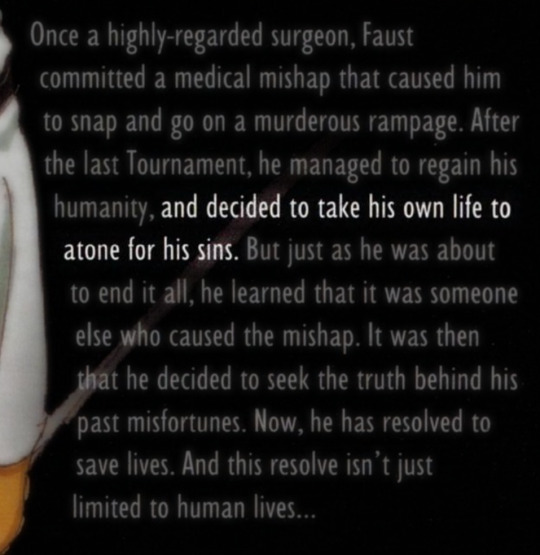
-
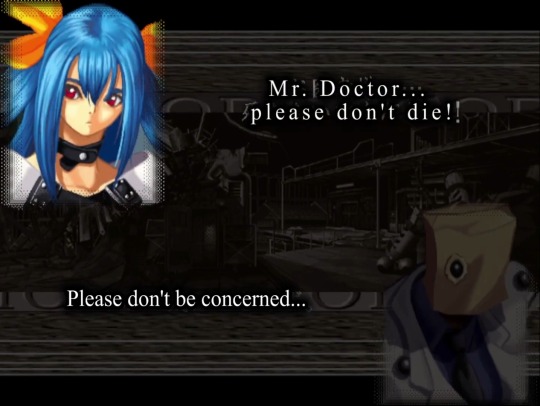
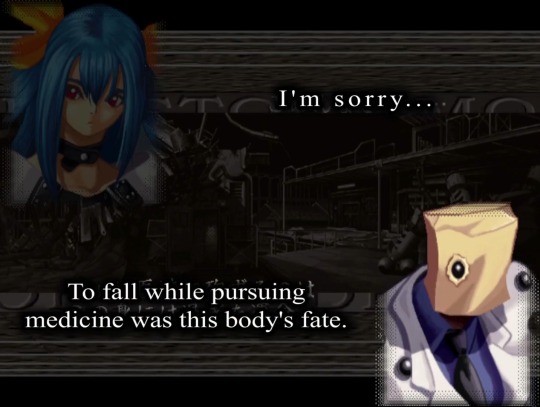
-
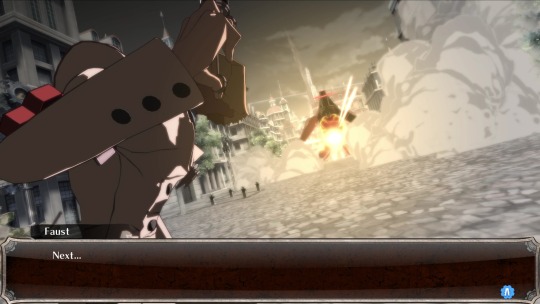
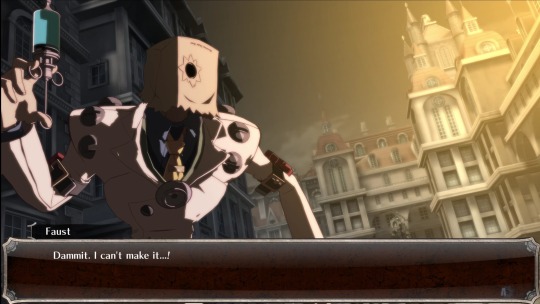
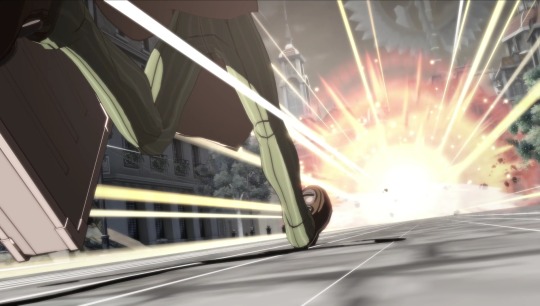
-
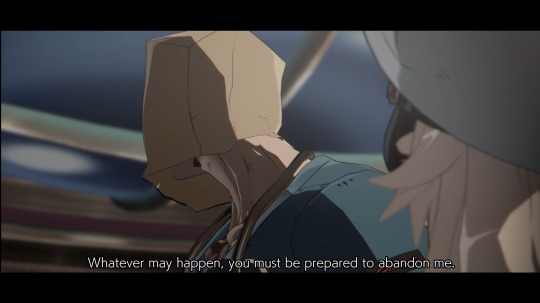

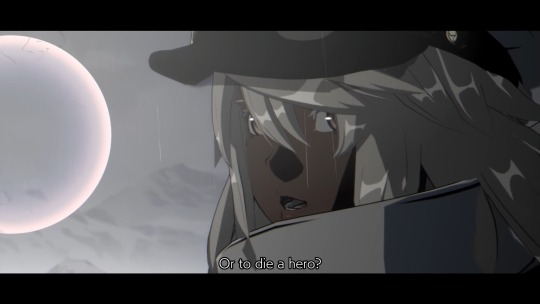
-
#guilty gear#faust guilty gear#guilty gear x#guilty gear xrd#guilty gear strive#guilty gear strive another story#guilty gear spoilers#?#uhh#character suicide#cw sui mention#cw suicide mention#he's a fictional character but#yeah#thinking about how Faust was mentioned to be suicidal in GGX and while he's said to have stopped trying he's still consistently shown to#have little to no regard for his own life and openly embraces the idea of himself dying all the time#like in Another Story Ram's words make him actively confront this finally but it's always been part of his character#idk#idk theres so much to say and I cant word it well so keeping this all in the tags i guess
36 notes
·
View notes
Text
Very bizarre to watch people be surprised or annoyed by the fact that Francis Crozier is an unpleasant person at the start of the story. Particularly book Crozier where we’re getting a third person view of his thoughts
#sorry I joined a discord server recently and I’m seeing some baffling takes about the man#cannot stress enough that he’s supposed to be unlikeable and unpleasant at the start of the story#this is so. he can have a character arc. and become who he is at the end of the story#he’s a suicidal drunkard who’s got a chip on his shoulder about women bc he can’t take rejection from one#being inside his head is going to be. unpleasant#I’m beginning to think that the book isn’t as bad as some people say (in some regards) and rather there are people who perhaps.#haven’t returned to the source material in a while#but I’m not that deep into it yet so this is just. pondering#sun in an empty room
33 notes
·
View notes
Text
I can't get over how that post is just seriously bizarre maybe it would sound less crazy if their reasons weren't He had a feminine username and worked in tech and was a leftist
#likr to even bother looking into that over this particular kind of death is so ..#looks way worse when those are the reasons especially with speculating that the surgery thing is why he was ready to die??#how is that not similar to people calling him depressed and suicidal stop trying to find other reasons for his death#implying he killed himself because of difficulties getting bottom surgery after he self immolated in protest of genocide#is like both so insensitive in regards to palestine and accidentally transmisogynistic i donr even know whatto say
30 notes
·
View notes
Text
I don't actually think phoenix thought miles edgeworth was dead post aa1
- gumshoe must have been way too suspicious (and not crying enough)
- no funeral, nothing, no details, way too secretive
- he literally says that miles was dead "to him" and that he "never wanted to see him again"
- this just makes a lot more sense for his arc i am begging you, aa2 is NOT about phoenix being a poor little guy who is unrightfully betrayed by his friend, aa2 is about phoenix coming to terms with the reality of things and that not everything is always black and white
He WANTED to it to be black and white. He thought miles left me, he's dead to me. But it's NOT. He's in DENIAL, that's the point, that's the whole point. Miles managed to get by on his own. He managed to be okay. Without phoenix
Phoenix had his major i can save him attitude in aa1 and he NEEDED this reality check. He was kind of obsessed with edgeworth (wether romantically or not is entirely irrelevant) and he Literally said he's the only one who can save him. And while he was actually RIGHT, that wasn't the point. The point was that it's not that simple and while he changed miles' life, miles was able to continue living it on his own and phoenix needed to realize that
Yeah the way miles left fucking sucked, but i think they kinda needed that. Phoenix depends a lot on other people, he literally falls into a depression after maya leaves post aa1. Plus, his miles thing was sort of.... Done? Or at least on halt. This was the Reason he became a lawyer and now there was neither a goal (miles) nor someone to walk the path with (maya). This kind of dependancy is Not good. So miles leaving, while it was extremely harsh, way absolutely necessary
And i think erasing the psyche behind this in favor of a dramatic fake death is... Kinda sad
Phoenix was so MAD at miles, That was the point. He was heartbroken because he was left, because he felt betrayed and not because he lost someone. This is a big difference and you can see this SO CLEARLY in the game
Sure, phoenix has a right to be mad at miles, to an extend. But this wasn't about him having a right to be mad, this was about phoenix feeling entitled to miles' personal life and personal development. If you say he thought he was dead, then you erase the whole aspect of Phoenix letting himself be lead too much by his emotions and not thinking rationally enough. WHICH IS THE WHOLE POINT OF HIS ARC IN AA2.
Sure. Grief is also a theme in this game. And i'm not saying phoenix ISN'T grieving miles. And i know that it also parallels the cases in the way of grieving people being consumed by anger. But it's different with phoenix because he's mad AT edgeworth. So it only makes sense for this to be combined with the theme of phoenix Being Wrong because he's Extremely Emotional
If he ends up just being mad bc he fakes his death, what's wrong about that? Of course he's also entitled to being mad at miles for leaving like this, but like i said - it's not black and white (like it would be in a fake death scenario). Miles had his reasons for what he did, he wanted distance and even though the way he left wasn't nice, the idea was truly his right (not saying that miles is not to blame here. I'm just saying they do the weirdest shit but it just always Works)
It also parallels franziska feeling left behind by miles, but that's a different story
Basically yesh i think it's implied that he didn't really think miles was dead and also it would make so much more sense for their relationship and devlopment as phoenix learning to see things with more nuance is literally an essential part of the second game and his entire character arc
#phoenix wright#ace attorney#aa spoilers#aa2#justice for all#miles Edgeworth#narumitsu#bc yeah#i don't need a discussion on this post btw. if you disagree keep scrolling#but yeah i simply canNot see phoenix thinking Miles committed suicide as canon#and it's an immediate turnoff for me regarding character analysis sorry#don't mind my rambling#i know this isn't a very cosnistent post but still
118 notes
·
View notes
Text
[Tw: Rape, suicide]
I was browsing through Magadon's story for Raphael Reasons and...

Is it time to kill Mephistopheles? I really think it's time to kill Mephistopheles.
(Note, since Magadon mentions his mother surviving: The lore about cambions' mothers dying during birth comes from The Planescape Monstrous Compendium Appendix, which is 2e, and Expeditions to the Demonweb Pits, which is 3e [both editions are also interesting for consistently putting Cambions in with Demons]. The 5e Monster Manual seems to imply that Cambions' mothers might live: "Cambions grow into ruthless adults whose wickedness and perversion horrifies even the most devoted mortal parent. Even as a youth, a cambion identifies its rightful place as an overlord of mortals. It might orchestrate uprisings in towns and cities, gathering gangs of humanoids and lesser devils to serve it." 4e only says that cambions can be raised in one realm or the other without getting into specifics.) (All this to say that I support any means of torturing Raphael possible and highly encourage finding new and exciting ways of doing it, BUT it isn't necessarily inherently keeping with 5e that the cambion's mother HAS to die.)
#rape tw#suicide tw#raphael the cambion#raphael bg3#bg3 raphael#honestly i just wonder what's WORSE: your mother to die or your mother to reject you entirely because you remind her of the#worst thing to happen to her#(personally i'm never a fan of having rape just to show that a character is PURE EVIL -- I always hc'd that Raphael's mother was#a human noble who made a deal with Mephistopheles out of ambition)#(but...well.)#('I suspect he has many' -- including a half brother who is at least a millennium older than Magedon)#(And...given that Lae'zel references Magedon if you turn down Raph...)#(...I don't think it's out of pocket to suspect that...the writers...knew....about...)#(also something something something Raphael's insecurities regarding his humanity are complex but also...#something something the mortal realm rejected him first something something something)
17 notes
·
View notes
Note
Do you really think people are going to help you out with your economic issues? People in the Byler fandom don't owe anything to useless people who haven't put out ANY CONTENT out in MONTHS. If you really want to help your family out, make yourself useful and kill yourself so you can stop whinning, taking up space and eating their food. That way they can stop wasting their money on a cripple whos going to die soon to poor health anyways.
should probably just block you, but this is so vile it's somehow funny (?) anyway, no can do, anon; basic funeral expenses are far too much for my family to afford atm so it wouldn't even help.
and i know people don't owe me anything. even if i posted ten graphics a day no one would owe me anything. just thought i'd share stuff in case someone wanted to help, is all. considering there is a risk of us getting evicted, at the very least making a couple posts (in my blog) on the situation has helped me vent a little; please feel free to ignore any and all personal posts i make.
#tw suicide mention#tw ableist language#kinda depressing that this is the first and only ask i've gotten all week in regards to my family's situation (in this account)#but it is what it is :\#anyway. send stuff if you want and can. don't send anything if you don't want to or can't afford it comfortably. it's all fine#i only shared it because of my family. whom i can't help much these days because of my horrible health and the nonsense :(
23 notes
·
View notes
Text
A Thought on Hu's Secret
Throughout the past couple of months, I've been rewatching DRDT (more on that once I finish it) through Weeby Newz's streams. They're very fun, and I recommend them if you want to experience DRDT in an audio format, but, that's neither here nor there. I've just reached the start of Chapter 2, and with it, the area investigation that kicks off the chapter. Rewatching the scene introducing the Dress-up Room got me thinking-- not necessarily about the murder, but instead, about Hu's backstory and how it might intertwine with her secret. (CW for DRDT spoilers through 2-2 and discussion of suicide/suicidal thoughts, specifically overdosing.)
Despite the hesitancies I've had in the past, I am now of the belief that Hu probably has the secret, "You were quite the hopeless child. Dying once wasn't enough, so you attempted suicide three times." It's mostly because I don't think that that secret would make sense for Levi, Min, or anybody else, anymore. But, evidence such as Hu not wanting to share the self harm secret line up with this interpretation too. So, I'm not trying to argue that Hu doesn't have that secret here, because I still think it's the most likely. Instead, I want to pass something on to everybody else who thinks Hu is the hopeless child to see what you all think.
After Teruko, Whit, and Hu get their makeovers, Hu comments on her new dress being very similar to what she wears at home, down to the brand. Whit keeps the ball rolling by pointing out that a lot of things about the set seem to be creepily catered to the students. One such thing he brings up is students' prescriptions. Here's what he has to say:

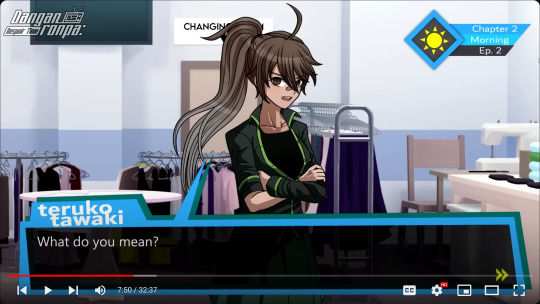
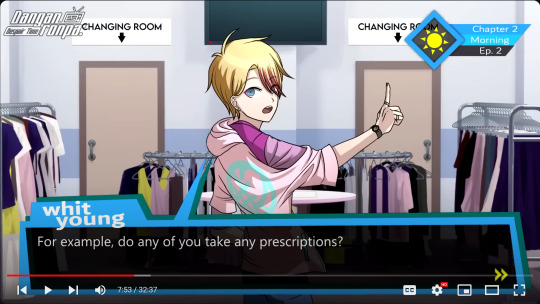

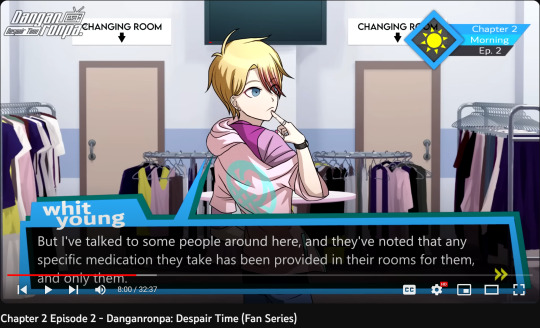
In my mind, ever since solidifying on the belief that Hu was the hopeless child, I believed that Hu was one of the students with the prescriptions. If Hu were that suicidal, it would make sense if she was taking something to counteract that. And Hu is a friendly enough person that I could fully believe Whit talking with her about a sensitive subject such as this.
But... was Hu actually one of the people who takes a prescription? On a second read, I think the answer may be, "no."
If Whit already knew that Hu took a prescription, why would he ask her? And, yes, he immediately followed it with "that was a rhetorical question," which could be in an attempt to save Hu from having to admit she took a medication in front of Teruko. However, if he already knew, it would have been very easy for him to just lead with "I've talked to some people around here who take prescriptions, and..." To me, asking Hu and Teruko if they take any prescriptions is an indicator that he did not talk to either of them before about that aspect of their lives. Instead, commenting on the rhetorical question was a countermeasure to his slip up of accidentally pressuring Hu and Teruko into discussing something private.
Okay, that's not the most solid evidence. What about Hu's response?
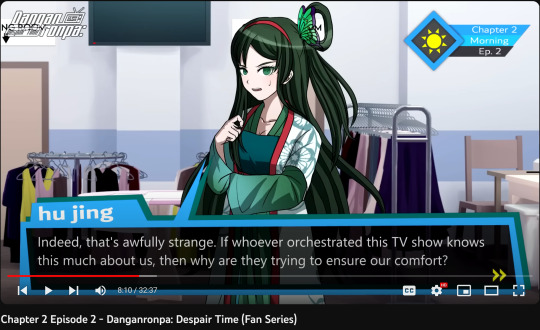
Once again, this seems like something that Hu would only say if she had never thought about something like this before. At the very least, it would be something that she hadn't talked about with Whit before, unless they're both putting on an elaborate performance for Teruko's sake. I wouldn't go so far as to say that doing something like that would be fully out of character for Hu, but it does seem like a pretty weird thing for her to do based on what we've seen of Hu so far.
So, what does that mean? Well, it means that, assuming that Hu does in fact have the hopeless child secret, Hu attempted suicide three times, and yet may not take any medications for it. We can't guarantee that she doesn't, because if Whit and Hu never discussed medications before, it's possible that she does and Whit just didn't know about it. However, on DRDTdev's end, it would seem a little strange to me to have a list of unknown students who take medications, not have Hu be part of that list, but have Hu still take medications.
Now, full disclosure, I have never needed to take any medications before, so I could have things wrong. If I do, I apologize, and I would be happy to correct myself via feedback from anyone who does who's comfortable sharing.
After some very brief research, it does seem like some suicidal people aren't prescribed any medications by their doctors, because 1) either the source of their suicidal tendencies isn't something that can be treated by medicine, 2) the doctor is worried that a misdiagnosis could increase the suicidal tendencies to a dangerous degree, or 3) the doctor is worried that the patient might use the medication to overdose. However, antidepressants and anxiety medications are often used as counter-suicide methods for patients whose suicidal tendencies stem from depression or anxiety respectively. Antipsychotics and mood stabilizers are also sometimes prescribed to suicidal people with conditions such as schizophrenia and bipolar disorder.
So, if Hu both has the hopeless child secret and doesn't take any medications for it, it could imply a couple of scenarios:
The impetus behind Hu's suicide attempts does not include depression, anxiety, schizophrenia, or bipolar disorder.
No doctors were ever made aware of Hu's suicide attempts.
Despite having depression, anxiety, schizophrenia, and/or bipolar disorder, any doctors that Hu saw did not see it fit to prescribe her any medications. (Due to Hu's seemingly traditional upbringing, it could be that any doctors Hu's family brought her to don't believe in medicine. Huh? Amane who? /j)
Despite being offered medication, Hu chooses not to take it. If extreme enough, this could even line up with her preferences being for them to not exist in her room at all.
I think that any of these possibilities have some very interesting implications on Hu's backstory, which we know very little about at this point.
Of course, to even get here, you have to rely on several inferred implications, including the idea that Hu even has the hopeless child secret in the first place! It's definitely possible that I'm the only one who even believes in the conditions that led me to my three potential conclusions in the first place. Or, maybe this line of logic was already obvious to everyone else, and I'm not really bringing anything new to the table here. Still, I feel that Hu doesn't often get a chance to shine in the DRDT theorizing zone, so when I had this thought, I decided to put it out there.
Thanks for listening, and, if you have anything to say, feel free to respond! Here's hoping that, in one way or another, we learn a little more about Hu's backstory soon after the story resumes. Until next time!
#danganronpa despair time#drdt#drdt spoilers#hu jing#whit young#teruko tawaki#cw suicide mention#cw overdose#am i cooking here or not idk#given how little i know about medications i am more nervous than average about publishing this#hopefully i don't just sound like a clown#but i do feel like there's some kind of disconnect that could be explored here in regards to hu's character#any hu heads out there got any thoughts? hit me up#'past couple of months...' she's so pretentious. shut up it's fucking two months. 'past couple of months...' /ref#my theories
20 notes
·
View notes
Text
I genuinely don’t understand how someone could watch Castlevania, a series where no one is morally perfect, and come away with the conclusion that “all vampires are pure evil, killing them is a mercy, and if a decent person got turned into a vampire they’d off themself”
#netflix castlevania#castlevania nocturne#olrox#castlevania olrox#fandom wank#tw suicide mention#just an odd take to have if you enjoy vampire media if you ask me#especially when you’re most vocal about that take in regard to the gay Native American vampire#I’m not trying to sling mud but seriously#yes obviously vampires are a metaphor for colonization and oppression#but they’re also a very powerful metaphor for social otherness#whether that’s because of sexuality disability neurodivergence ethnic minority etc#I might be in a mood to start drama today
44 notes
·
View notes
Text
guys this "keeping myself busy with distractions so I don't get sad" thing isn't working
#my mom is basically scrubbing the house of all traces of her bc thats how she copes. thats what she did when dad died#like two days later she was cleaning out all his medical equipment and stuff#i guess thats a way of dealing with it :( just doesnt really work for me because it makes me feel their absence even harder#like for me i personally wanted to keep Dad's stuff around for a while because. idk i guess it just felt like he was still kind of there#in a way. i guess. i dunno#obviously losing a pet is easier to deal with than losing a parent but it still blows dude i hate this#(* a parent that you had a good relationship with. i know that im very fortunate in that regard. not everyone had that and i need to count#my blessings)#idk this feels harder than losing my childhood dog because jojo was basically my constant companion for the past several years#after dad died i got suicidally depressed and didnt leave the house and was unemployed for a good chunk of time and she kept me company#taking her for walks and hikes was the only thing i enjoyed doing and the only thing that got me out of the house. she was always there#(also there's probably some psychological component to the fact that we adopted her specifically to be a companion for dad#when he was wheelchair-bound and couldnt go anywhere. so she kept him company. and then after he died she did the same for me#so. idk. like.... i feel like theres something there lol)#mia.txt#animal death
10 notes
·
View notes
Text
Pei Ming Week Day 4: Sacrifice
Today I give you 3 drabbles because I went from having no ideas to multiple ideas! xD
Huge thank you to @kefis for the prompts @ococor for cheerleading <3
The first two are sort of related, the last one is not
I.
“I still say we should be helping Xianle,” Pei Ming grumbles. “This is disgraceful.”
“Yong’an is the practical choice,” Rong Guang replies. “Xianle’s fall is a given. May as well farm goodwill with the future king.”
Xianle has their prince, Pei Ming wants to retort, but the words taste like bile. Once again, his mind is dragged to Yushi, to the beloved queen that won her kingdom a scant few months. Already they don’t speak of her.
Is Xianle’s god-pleasing prince doomed to the same fate?
Rong Guang pats his shoulder.
“There’s nothing praiseworthy about self-sacrifice. You should remember that.”
II.
“For his Highness,” the scrawny excuse of a soldier mutters as he swings his splintered practice sword.
So young, head wrapped in bandages, a sword slipping from his grip, and still ready to sacrifice everything for some prince.
There are many things Pei Ming wants to say to him. Dozens of scoldings, criticisms of his priorities –
“Hey,” he called out despite himself. “Your sword grip is wrong.”
Pei Ming gives some pointers and leaves, saluting the soldier in his heart.
He doesn’t know why he’s bothering. This child won’t survive the battlefield anyway.
His prince will never know his sacrifice.
III.
“How could you do this?” Pei Ming shouts. “This is your future – your divinity! How could you just throw it all away? And for a girl!”
Pei Xiu forehead smacks against the ground. “I have no regrets, General,” he pleads, voice quivering with emotion unfelt in two hundred years. “She sacrificed everything for my ambitions. She never deserved her fate. Even if I’m to be a disappointment in your eyes, this path for her freedom is a small price – please understand.”
Pei Ming does not understand.
Despite being heralded as the God of Love, he’s not much of a romantic.
#tgcf#pei ming#hua cheng#rong guang#pei xiu#peimingweek2023#fortune's fanfics#i'm in love with the idea of xuli politicking in the xianle/yongan conflict#pm & rg there to assess the situation and help organize the soldiers#pm hates it and thinks they should be supporting xianle over a rebellion#rg is taking notes for his future rebellion#meanwhile in regards to pei xiu pm is all for grand gestures of love but not when it's his grand-grand-nephew#and not when its career suicide. he's a practical god of love!
19 notes
·
View notes
Text
Following up on my post about episodes 5 and 6, here are my thoughts on the mental health side of episodes 7 and 8 of The Eighth Sense.
Hey, @waitmyturtles, it's finally finished!
As in my last T8S post, I'll start by talking about what I see going on with Jae Won (and this time, to a lesser extent, with Ji Hyun), then get into my thoughts about what his therapist is up to.
Here’s what I’ll be talking about below:
lowered affect and psychomotor symptoms
the "freeze" response and the depressive side of PTSD
"I want to heal his wounds"
Jae Won's therapist: dancing over the line
the portrayal of mental health interventions in The Eighth Sense so far
what's next?
lowered affect and psychomotor symptoms
When it comes to Jae Won, I think for the most part his deal is readily apparent to anyone with a reasonable amount of insight, whether they have mental health training or not (though I hope my perspective might help clarify some stuff). As others have pointed out, he's incredibly numb and shut down. It's clear that he feels responsible for Ji Hyun's accident even before he says so directly to his therapist, and that he has some kind of distorted thought process that is telling him that staying away from Ji Hyun will keep him safer than if he allowed himself to be close to him again. This also functions as a way of protecting himself from experiencing another loss--if he doesn't have anyone in his life that he actually cares about, he can't get hurt that way again.
By the way, just like the capacity for self-blame I talked about last time, it's remarkable how readily people who've experienced trauma can form strong beliefs that don't make rational sense (often involving magical thinking) while seeing no reason to doubt those beliefs. For example, it seems pretty certain that Jae Won is consciously telling himself, "Everyone I love dies or gets taken away from me in some way, so if I love someone I'm putting them in danger." There's no possible way this could be true, but it feels like the truth to him and he's unable to see how obviously false this belief is.
A couple of the things we're seeing with Jae Won have psychological terms that can be used to describe them more precisely. You know how Jae Won's face is super expressionless for most of episodes 7 and 8? In psychology, we use the term "affect" to mean the expression of emotion in someone's face (and to a lesser extent, other parts of their body). ("Affect" has a really different meaning in other disciplines.) Identifying the type of lowered affect Jae Won has sheds some light on his emotional state.
There are standard descriptors that psychologists and others use in reports and notes to talk about people's affect. "Broad" or "full" affect means a person shows a typical amount of emotion in their expression. "Labile" affect means that the person is showing disproportionately strong emotions; often these emotions change abruptly as well (for example, if someone laughs one moment and cries the next and neither seem appropriate to the situation). Then you have descriptors for people who are showing less emotion than normal. "Restricted" affect is somewhat subdued compared to full affect. Just like it sounds, it's as if the person is (consciously or unconsciously) restricting the amount of emotion they allow others to see. A step down from restricted is "blunted" affect, which is a pretty intense symptom. Someone with blunted affect shows very little emotion, even when talking about or experiencing something upsetting. Another step down is "flat" affect. I often see people using "flat affect" to describe a person who actually has blunted or just restricted affect, but flat affect is a lot more marked than that. True flat affect means that the person shows absolutely no emotion. It's extremely rare. You're highly unlikely to meet a person with flat affect in your daily life, unless you work in an inpatient mental health facility.
Where is Jae Won on this scale? His affect is blunted. This is a very big deal! When someone is experiencing mental health symptoms so marked that their affect is blunted, especially almost all of the time as we observe in Jae Won's case, there is a lot of cause for concern. As you might imagine, it's often reflective of the person being very disconnected from their own emotions. This symptom can be associated with a number of diagnoses. Some of these involve psychotic symptoms, which might interest proponents of the "everything after episode four is a hallucination" theory. But it's also associated with PTSD and depression, and I think it's pretty clear that's at the root of Jae Won's deal. After all, his affect became blunted right after he was retraumatized and massively triggered by Ji Hyun's accident.
A great example of Jae Won's blunted affect happens in the scene where Ji Hyun finally gets him to talk to him in private and he keeps insisting that everything that happened between them "was nothing." It's not normal for someone to have almost no affect when having a conversation like this, no matter how they feel about the other person or their history with them. If their relationship really meant nothing to him, we'd expect Jae Won to look flippant, irritated, contemptuous, guilty, maybe superficially sympathetic, but we'd expect him to have some degree of affect. The fact that he can sit there, dead-eyed, during this conversation speaks volumes.
Another term that applies here is "psychomotor retardation." Sometimes people say "psychomotor slowing" instead to avoid the connotations of that second word there. Or you may just hear about "psychomotor symptoms." In severe depression, people's speech, movements--really, just about everything they do can become slowed. If you've ever been around someone who was severely depressed, you may have observed this. I had a friend in college whose psychomotor symptoms got so intense during a depressive episode that I misunderstood and thought she was drunk. The fact that this is coming up for Jae Won is another giant red flag that he is in a massive amount of distress.
the "freeze" response and the depressive side of PTSD
Given how much informed trauma discussion happens on tumbr, I'm guessing a lot of folks reading this may already know that contemporary trauma scholars have added to the well-known "flight or flight" set of trauma responses. The most common change is to add "freeze" to the list to make it "fight, flight, or freeze." Some also add "appease," or "fawn." We're all familiar with the fight response to trauma (go toward the feared object and try to fight it) and the flight response (run away from it). The freeze response is analogous to instinctively playing dead when attacked by a dangerous wild animal, except it's usually automatic, something our body does whether we want it to or not. People having a freeze response may dissociate, or they may find it difficult or impossible to get their body to move. The "appease" response refers to an instinctive impulse to do anything and everything to appease a person who poses a threat. It's a trauma response that frequently comes up in partner abuse situations. The "fawn" response, sometimes called a "collapse" response, is a kind of last ditch attempt by your brain to disconnect from your body so thoroughly that you'll feel less pain as a result of the trauma. I'd group it with the "freeze" response--they're kind of like different degrees of the same thing, with fawn/collapse being even more extreme than freeze.
I had a mentor, Dr. S, in one of my training positions who had put together his own model of how trauma works, one he had cobbled together from a number of sources. Usually when a mental health person tells you they have this kind of homemade theory bricolage deal it turns out to be a hot mess. But Dr. S was incredibly smart and experienced and his theory was coherent and useful. I wish I knew where he got the various components from. I know he was into somatic experiencing therapy and it was part of the model but there were other traditions he had pulled from as well.
But the gist, as it applies here, is this: he categorized the acute trauma responses (fight, flight, etc.) into two main groups, activating on the one hand and freeze-y/deactivating on the other. And those acute responses, the responses that a person has in the moment when the trauma is happening or soon afterward, are related to how their PTSD symptoms manifest, if they develop it. According to Dr. S, people with PTSD usually have a sort of predominant tendency where their PTSD symptoms lean more toward the freeze-y side, which is the more depressive and dissociative side, or the fight and/or flight side, which involves more overt dysregulation, anger, risk-taking, and so forth.
The thing that made me think about Dr. S's model of trauma when I watched episodes 7 and 8 was something he always said about these different ways trauma shows up as symptoms. I wish I could remember the rationale--like, what the supposed reason was that things work this way--but I remember that once he pointed it out I started seeing examples of it everywhere. He said that if you're stuck in a freeze-y, depressive state with your PTSD symptoms, you can't move directly from that into a more healthy, engaged relationship with your emotions, your memories, and the world around you. Instead of going straight from freeze mode into something healthier, he said, you have to spend some time in fight/flight mode. It's like, metaphorically speaking, there's no path out of the freeze zone without passing through fight/flight territory.
Jae Won's PTSD typically shows up in a very freeze-y way. His depressive symptoms were his most noticeable ones from the start of the series. He dissociates rather readily. He was numb even before what happened with Ji Hyun, then gets even more numb. Actually, I'd bet that when he resisted his connection with Ji Hyun before, and to an extent in 7 and 8, one of his main reasons was that Ji Hyun makes him feel alive and that scares him. Ji Hyun makes him "thaw out" in a way he doesn't feel prepared for. And then, of course, as soon as he dares to let his guard down with someone and experience real connection, what happens? A new trauma and massive triggers for his past trauma. So he goes back into freeze mode with a vengeance.
And he gets really passive. Just sort of floating along. Not kissing Eun Ji back when she kisses him, but not saying no or pushing her away either. (Well, there's one extremely gentle push after which he takes the tiniest step back, but that's it.) When we see him alone, he's just lying in bed with his eyes wide open staring into space. But there is one thing that makes him wake up, something that puts him squarely into fight mode: Tae Hyung making shitty comments about Ji Hyun. As audience members, it's natural to want to cheer this on in part because Tae Hyung is such a dick and that was incredibly below-the-belt. But I think another part of what makes us want to applaud is that Jae Won is finally thawing out again. It's fleeting. And the way the show is edited drives this home even more since there's an abrupt cut from Jae Won pummeling Tae Hyung to him talking with their professor in his office looking incredibly spaced out. But it happens.
"I want to heal his wounds"
One thing I've noticed in more than one response to episodes 7 and 8 is people being critical of Ji Hyun's words when he tells Joon Pyo, "He wants to be seen as a strong person, but has a lot of wounds. And I want to heal his wounds." Basically, I'm seeing people say that it's up to Joon Pyo to heal himself and that it's naive of Ji Hyun to think that he can "heal" him. And to an extent, they have a point. If Ji Hyun claimed he was going to singlehandedly heal Jae Won's pain and trauma, it would be extremely unrealistic. Especially if he claimed he'd do it whether or not Jae Won participates. But he says he wants to heal Jae Won's wounds, and I think that's more reasonable. I would expect that most of us, in his shoes, would at least want that on some level, even if we don't think it's possible.
But more than that, I think this is an example of a certain cultural attitude, one that (in my experience) seems more prevalent in individualistic cultures like those of the U.S. and much of Europe. It's related to the idea that "no one can love you until you love yourself." I find this attitude just as unrealistic, and just as riddled with wishful thinking, as the idea that we can heal a partner by our force of will alone without their participation. Because individualism is a wishful fantasy in a way. It tells us that we can fix ourselves without having to worry about making connections with others or whether those others will be willing or able to give us the love we need. But we can't just wish away our relational needs.
Human beings are relational creatures. We develop from birth through our relationships with others. These relationships can be damaging or they can be supportive and strengthening (or, of course, both). We don't have to wait until we are perfectly self-sufficient before we're capable of receiving love, deserving of love, or able to benefit from love. When someone loves us deeply and shows that to us, when they show their love through caring for us, it makes a difference in our lives. Of course it does! And if we are completely lacking in that kind of love, life is harder for us.
I could go off for pages and pages about this and I may well do so here one of these days. For now I'll say that if you're interested in combating your individualistic bias and thinking in a new way about the fundamentally relational nature of humanity, I highly recommend the first section of Kenneth Gergen's book Relational Being--it's phenomenal. (I first read it on a long bus commute and I was gasping so much that people started giving me looks. And I normally never gasp aloud at a book.) Stan Tatkin's work on attachment dynamics in couples is also really instructive here. Tatkin talks about how we've been conditioned to think it's burdensome and excessive to ask for our partners to be there for us and take care of us in certain ways that are actually imminently reasonable and part of a healthy relationship. This isn't to say that there's no such thing as a burdensome demand or an onerous expectation of a partner. But there's a whole class of caring for others that gets stigmatized in our culture that's actually not only OK but healthy and beneficial.
What about Ji Hyun? I think it's not unlikely, given his age and lack of relationship history, that he's being a bit overly idealistic. But I also think it shows an admirable degree of self-awareness that he sees that he has a desire to heal Jae Won. And honestly? He already has healed him to an extent, even if subsequent events seem to have undone it. He can't heal Jae Won just by loving him. Jae Won would have to allow himself to be close to Ji Hyun again for that to happen, and he'd also have to open himself up enough emotionally to take in what Ji Hyun has to offer. And in order for him to heal in a substantial way--for example, to stop having an active case of PTSD--he'd also have to put in some independent effort. But it's also true that if Jae Won lets him, Ji Hyun actually could make a real difference in Jae Won's healing. And Jae Won could do the same for Ji Hyun.
Jae Won's therapist: dancing over the line
Jae Won's therapist/psychiatrist has been playing around with boundaries a bit since we first encountered her. Her "just tell me what your worries are!" joke ventured a bit close to a boundary line for me, but it stayed on the right side and made sense in context so I considered it pretty skillful. Sometimes getting close to those therapy boundaries is actually really powerful. I mean, it may sound like this would just be a lapse, and then we could debate whether or not it was forgivable. But actually, playing with therapy boundaries in a careful way that doesn't go too far can be an particularly good idea, depending on the situation and the client. Sometimes factors like the formality of therapy, clients' idealization of their therapist, their worries about seeming like a good person or being a "good client," and so forth can lead to the therapy process getting completely stuck. Calling some of these things into question can be really useful.
So initially, I thought Jae Won's therapist was handling this sort of thing well. At the same time, I was concerned that she might overdo it. I had a therapist once who played around with boundaries in a safe, careful way at first, and it really benefited me, but later, he was careless about some important boundaries and actually crossed the line to the point where I had to stop working with him. I didn't know if she'd do this, but I worried about it. Then episodes 7 and 8 happened.
Some folks have taken issue with her saying to Jae Won, "Why didn't you visit recently? I almost couldn't pay my rent because you stopped coming. You know every minute counts for the consultation fee, right?" I do think she's getting into risky territory here, but she ends up on the right side of the line by my standards (albeit barely). It should be completely obvious that Jae Won's attendance at their appointments doesn't make that huge of a difference in her bottom line. I actually see some reasons to believe she's likely an administrator or instructor/professor in addition to her clinical work (I'd be happy to explain my reasons but I'm trying not to get too far in the weeds). So she likely has other things to do besides see clients. And she's the kind of clinician that probably has plenty of clients. But no matter what her job entails, the fees from one client who sees her biweekly are not going to make or break her financially. She's trying to make light of her worry when Jae Won missed appointments (probably two, since a month has passed and that would mean two biweekly sessions).
Then there's the exchange about her experiences with clients dying by suicide. There are aspects of it that seem OK to me, but she crosses the line in my estimation.
When she first raises the topic, she asks him, "Did you think about extreme decisions?" This set off alarm bells for me. It's important that therapists show that they're able to speak clearly and explicitly about suicidality. Using euphemisms or beating around the bush conveys a lack of confidence and comfort with the topic that could undermine clients' faith in the therapist or make the therapist seem like someone they have to protect from learning about their suicidal thoughts or intentions. Thankfully, she switched to more direct terms quickly, so I felt like that made up for her initial vagueness.
Then she talks about how "the hardest time" in her work is "when my patients commit suicide." But instead of talking about the loss she would feel in that situation, she quickly pivots to talking about how it's difficult to decide whether or not to attend these clients' funerals. It's a weird turn. It makes it sound as if the hard part is navigating this funeral question rather than the actual loss of the patient. I'm sure that's not how she really feels, but this topic shift makes it sound that way.
I know that @waitmyturtles took issue with the way the therapist hashed out conflicting ideas around ethics in a conversation with a client, and I do think that's almost always something that should be avoided. But I also think if she had done it in the right way, it could have been OK or even a good idea. Why? Because as I wrote above, one good reason to mess around with therapy boundaries sometimes is in order to undermine the idealization of the therapist when it gets out of hand. In other words, sometimes clients need to see firsthand that therapists are human beings too and that they make mistakes and have growth areas--and that they feel confused about how to navigate some professional situations, as she talks about here. It's demystifying in a way that can be beneficial. My biggest concern is actually the fact that she's doing this around the topic of client suicide.
Even though she plays it off somewhat by seguing into an ethical quandary about funerals, Jae Won's therapist is still raising the subject of how patients' suicides affect her. And this is where I think she's really playing with fire.
There's nothing wrong with a therapist acknowledging that when/if a client ends their life, they are/would be strongly affected. To pretend otherwise would not only be disingenuous, it would make the therapist seem unfeeling and cold. But it's risky to do anything that might center oneself in the conversation about a client's suicidality. Basically, saying you worry about a client, saying you would be very sad if they died, and so forth can be not only OK but advisable if done judiciously. But spending a substantial amount of time talking about yourself when you're sitting with a client who has a substantial suicide risk is insensitive and dangerous.
Of course, this is partly because centering oneself as a therapist is almost always counter-therapeutic (not to mention shitty and wrong). But if a therapist centers themselves around this specific topic, it could also lead to losing access to vital information about the client's thoughts, intentions, and risk level.
If I'm seeing a therapist who I have a good rapport with, I'm going to be concerned if it appears I might hurt them. I may even be highly motivated to try to protect them. If I'm having suicidal ideation but I think telling my therapist about it will upset, overwhelm or frighten them? If I'm being told right and left how distressing client suicide is for them? I now have a very good reason to keep my suicidal ideation a secret. Once a therapist loses a client's trust that they can safely disclose their suicidal thoughts and intentions to them, risks immediately go way up. Bottom line: if a client doesn't feel safe telling you about that stuff, you can't help them when they're in crisis. You're operating in the dark, without access to critical information.
I continue to believe that Jae Won is at a substantial risk of suicide and/or self-harm. And he has shown time and again that he tends not to disclose much in therapy even when he's at his best. This is no time to play around with this stuff. His therapist needs to show him that she's a steadfast, safe, concerned, but also reasonably neutral figure right now if she wants to have any hope of keeping him safe. And she failed to do that in episode 7.
the portrayal of mental health interventions in The Eighth Sense so far
As before, I think that the show has shown Jae Won's therapist in a mostly positive light in the latest episodes. And without a doubt, it's a good thing that therapy is being shown at all here. But one thing we haven't seen so far is an instance of therapy actually helping Jae Won in any observable way. And I'm becoming increasingly convinced that the series will end without any specific benefit from therapy being shown. I get that this is a love story and the emphasis is bound to be on the ways in which Ji Hyun and Jae Won can make a difference in each other's lives. But if you're going to portray therapy at all, you really ought to include at least some sort of potential benefit from it. Otherwise you run the risk of sending the message that while therapy might not be actively bad, it's also not something that will help someone in a meaningful way.
I'm also concerned about how psychoactive medication is being portrayed in this series. There's been a lot of talk of prescriptions. In the deleted scene that's been making the rounds, the camera pans down at Jae Won's pill bottles as if to call attention to them, emphasizing them at a time when Jae Won seems to be falling apart. Maybe these are hints that Jae Won is going to misuse his medication at some point, or maybe not. But currently, they function as a kind of commentary. The implication seems to be something like, "Look how fucked up Jae Won is right now. He even has to take medication for his mental health!" It makes it seem like someone taking psych meds is a sad or worrisome thing on its own. This is exploitative and supportive of mental health stigma. If it turns out these cues were foreshadowing Jae Won misusing his medication to self-harm, the generalized medication stigma aspect could be less of a concern, but it still wouldn’t exactly be a progressive portrayal of mental health care. I hope the show's creators pull back from this or find a way to make it all worthwhile, but I'm becoming less hopeful about that as well.
what's next?
I have some thoughts about what's coming next for the story based on what we've seen so far. Well, I have a lot of thoughts on that subject, but I'm going to confine myself to those I see as mental health-related here.
There's a chance that Jae Won could engage in some kind of self-harm or make a move to try to end his life. It's hardly certain this will happen, but it wouldn't be out of left field. Given the attention paid at various points to Jae Won's medications, the most likely avenue of self-harm seems to be misusing them.
One potential turning point could happen if events bring up Jae Won's protectiveness toward Ji Hyun. This could come up due to something really overt if he has reason to believe Ji Hyun is physically in danger, but it's at least as likely to come up if he sees other people mistreating him. If Eun Ji continues to try to bully Ji Hyun and Jae Won witnesses it, or if Tae Hyung lashes out at him, this could have a big effect on Jae Won. After all, even in his highly depressed and dissociated state after Ji Hyun's accident, the one thing that brought him back to himself was Tae Hyung's shitty comment. I would tie this back to the idea I mentioned above, that the path from long-term freeze mode to something healthier may need to involve passing through a more activated, aggressive state in the process. Jae Won's protectiveness toward Ji Hyun could be the catalyst that causes this type of shift for him.
#the eighth sense#the 8th sense#jae won x ji hyun#the eighth sense meta#the eighth sense discussion#the eighth sense analysis#psychology of BL#media portrayals of trauma#media portrayals of mental illness#TW suicide discussion regarding a fictional character
61 notes
·
View notes
Text
Bertram Wilberforce Wooster why are you wishing a swift suicide on a fourteen-year-old oh my god
#he's so mean in this one#he also says uncle Willoughby should be thinking of the hereafter#it feels different than when he tells a friend of his to go boil his head because this is in the narration#letters regarding jeeves#jeeves and wooster#jeeves#idanit talks#suicide cw
16 notes
·
View notes
Text
horatio and ophelia are to be or not to be btw
#it’s not even just as surface level as one of them had to be and one of them had not to be#it’s about how hamlet pondered the question and in the end didn’t really get to choose#and yet they will tell his story with him as a hero#it’s about how ophelia will always be regarded as a mad girl who drowned herself#no matter what actually happened#her story will always be of choosing not to be#it’s about how horatio could’ve still pulled the cup away from a dying hamlet#but he didn’t#and now he’s stuck#hamlet#horatio#ophelia#suicide mention
15 notes
·
View notes